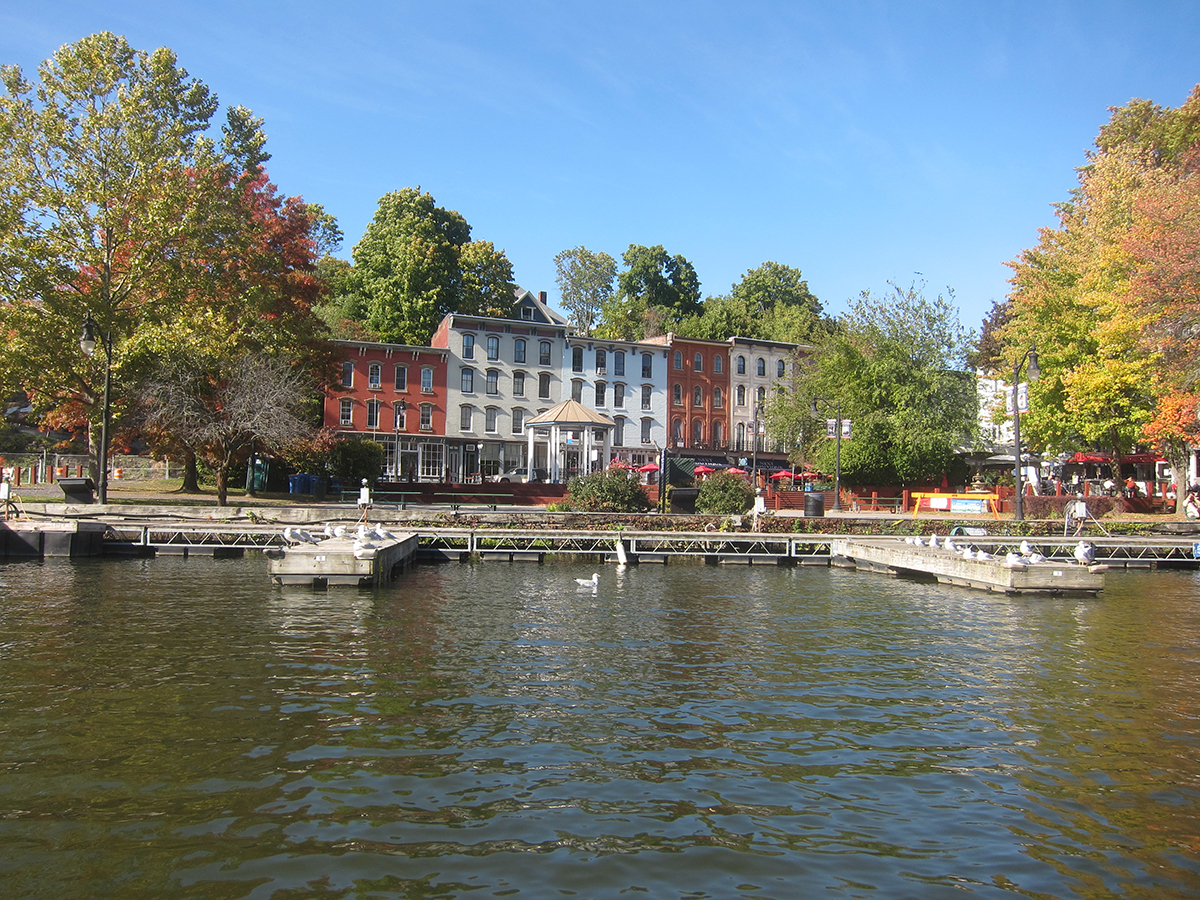A Post Carbon Gateway to the Hudson Valley and the World
Rondout Riverport 2040 is a comprehensive plan for remaking and transforming the Rondout Creek and Hudson River Working Waterfront, including the transportation of goods and people in a carbon-constrained future. It proposes a pragmatic, positive, and prosperous vision for the near future in which the communities of Kingston and Esopus are enriched by a transformed port, boasting a shoreline synergy of leading-edge maritime commerce and working waterfront technologies that profit and engage individuals, businesses and communities, allowing for an equitable transition beyond fossil fuels, as together we forge a vital and vibrant economic bond with the greater Hudson Valley Bioregion.
The planning for Rondout Riverport 2040 has been a collaborative effort based on both recent proof of concept sail freight vessels and solar powered passenger vessels, the logistics that support them, and a history of Kingston and the Rondout as an historical port. It’s born from a movement that started with the 1970’s oil crisis and a growing awareness of the implications of the climate crisis.
This plan provides a practical salient vision of resilient shorelines and a working waterfront, redesigned to protect our community from sea level rise and storm surges, built to accommodate a wide spectrum of business, cultural and social uses that will benefit our communities and the Hudson Valley Bioregion. This, to put it simply, is a waterfront proposal that “floats all boats,” promising equity and prosperity for our citizens, large and small industries, investors, entrepreneurs, craftspeople, environmentalists, boatmen and women, dreamers and doers. Woven into the plan are Just Transition principles of re-localizing production and consumption, driving racial justice and social equity, retaining and restoring cultures and traditions, advancing ecological restoration, and democratizing wealth, communities and the workplace.
As envisioned in this plan, by 2040 the Riverport will offer far more capacity and be more robust and resilient. In contrast to the current patchwork of diffuse land uses found on today’s waterfront, the riverport will be significantly more compact in land area. Rondout Riverport is unique because it is a collaborative effort by individuals, businesses, non-profit organizations, and local governments to use a placemaking process to plan for a regenerative port in response to the climate crisis.
We can best accomplish these visionary waterfront goals via an integrated “placemaking” approach. Placemaking provides a method for answering critical questions:
- What are the best ways to mobilize and coordinate our many community assets?
- How do we effectively draw on public and private partnerships to creatively identify opportunities?
- How can we successfully coordinate our implementation efforts?
- And where do we find the resources needed to accomplish our vision for a transformed riverport?
But here is a warning:
An optimistic future depends on our will to make it so. If we pursue politics and policy as usual, we could face a grim tomorrow as our region is hobbled by climate change…
Abandoned, flooded, moldering shoreside buildings and piers; low-lying and failing sewage treatment plants and electric utilities; eco-refugees crowding our upstate communities seeking limited food and shelter; and a polluted, dead estuary as oil and chemical plants are inundated. Despite sincere efforts at incremental change and adaptation planning, without visionary action right now, our region could face a dire tomorrow marked by rising water and plummeting economic fortunes. However, with proper preparation, cooperation and investment — could result in a revitalized and highly profitable Rondout Riverport at mid-century.
To realize the truly possible vision for the Rondout Riverport by 2040, communities must NOW begin to participate in a vigorous planning process, while taking key steps for future-proofing our shoreline against the harms threatened by an increasingly politically, economically, and environmentally chaotic planet. The path to a bright, sustainable future starts with community engagement and data collection to build an actionable vision for the Rondout Riverport, a vision that incorporates a proud sense of community and place, local stewardship, and widely shared economic opportunity. The choice is ours.
To learn more and to get involved, visit postcarbonlogistics.org or email [email protected]
Andrew Willner has been a leader, organizer, and advocate for the New York/New Jersey Bioregion for 25 years. He was an early proponent of the Waterkeeper model of water and habitat protection as the founder of NY/NJ Baykeeper. Andrew is the Executive Director of the Center for Post Carbon Logistics and a principal of the consulting firm, Sustainability Solutions. Andrew is a sought after speaker on a wide variety of subjects including environmental advocacy, climate change, habitat restoration, sustainability/resilience/regenerative, Permaculture and Transition, and is often asked to read from his fiction and non-fiction writing. Visit his website, www.andrewwillner.com
The views and opinions expressed in this blog post are those of the author(s) and do not necessarily reflect the official policy or position of Good Work Institute or any other agency, organization, employer or company. And since we are critically-thinking human beings, these views are always subject to change, revision, and rethinking at any time. Please do not hold anyone accountable to them in perpetuity.


